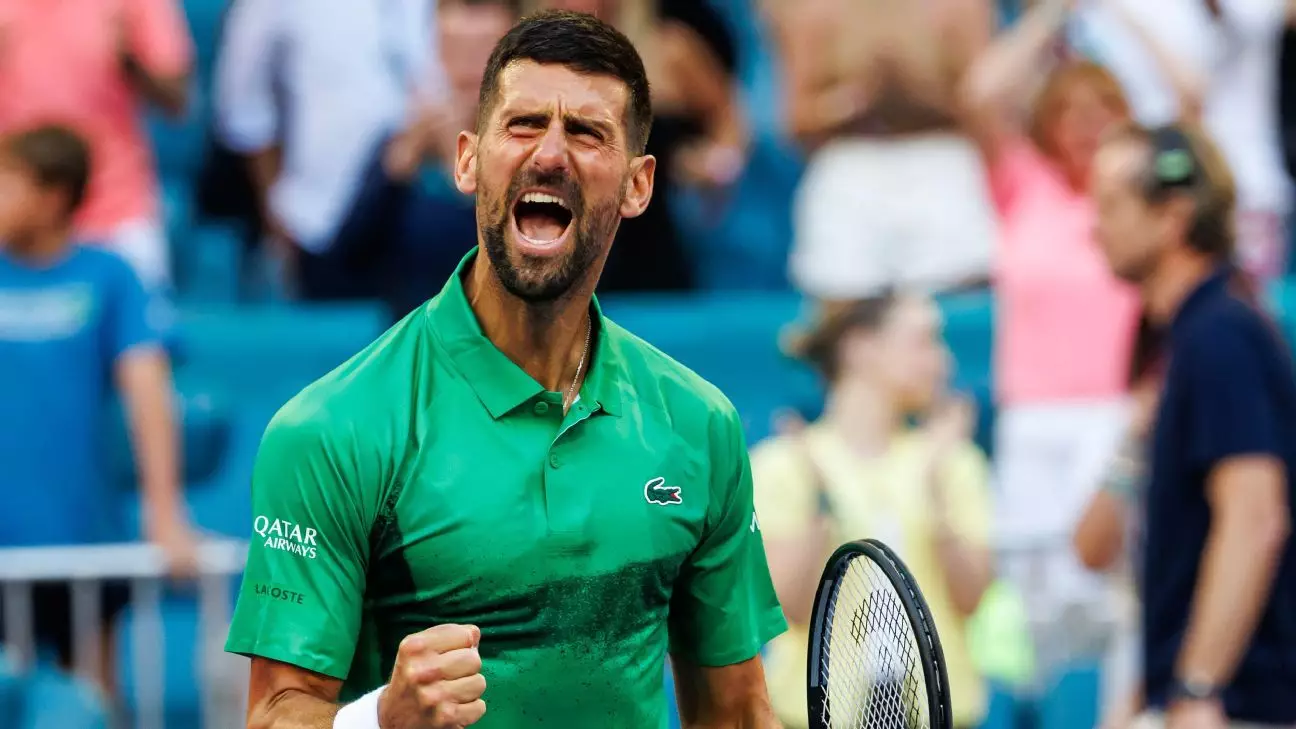In the high-pressure atmosphere of the Miami Open, Novak Djokovic, the seasoned champion, has discovered a new level of intensity that many doubted he could reach after a shaky start to the 2025 season. Facing off against American rising star Sebastian Korda, Djokovic not only demonstrated his signature prowess but also showed a determination that suggests he is on a mission — a mission to claim his seventh Miami Open title and the prestigious 100th professional win of his illustrious career.
After a delayed match due to an uninterrupted women’s quarterfinal, Djokovic entered the arena in South Florida with the weight of expectation heavy on his shoulders. The 37-year-old tennis titan, renowned for his competitive spirit, swiftly overpowered Korda with a 6-3, 7-6 (4) victory, taking only 1 hour and 24 minutes to do so. What stood out, however, was not just the score, but his remarkable resilience, particularly in the gripping second set. After trailing 4-1, Djokovic rallied back, showcasing the mental fortitude that has defined his career. This comeback is not merely a testament to his physical skill; it signifies a renewed sense of purpose as he gears up for the semifinal against Grigor Dimitrov, a player he has historically dominated with a record of 12-1.
Turning Point in Performance
Key to Djokovic’s triumph was his serving, which he himself identified as the cornerstone of his success during the match. With a staggering 83% first-serve percentage, he served up aces and deft placements while avoiding unforced errors, particularly under pressure. When asked about this pivotal aspect of his game, Djokovic simply stated, “One word — serve.” This focus on service reflects not only his tactical growth but also the feedback loop between confidence and performance — as he served better, he played better, and ultimately, he won.
The match also highlighted Djokovic’s connection with the Miami crowd, who rallied behind him, chanting his name even when he was up against a local favorite. This support is significant; it energizes seasoned players like Djokovic who are often perceived as standalone competitors rather than human embodiments of national pride. In moments like these, when the crowd becomes a part of the sport, Djokovic isn’t just battling his opponent; he is also striving to fulfill the expectations of fans who crave a thrilling performance.
Korda’s Promising Path
For Korda, the matchup served as both a learning experience and a springboard into the spotlight. Having recently triumphed over top ten players like Stefanos Tsitsipas, this match against Djokovic was another crucial step in his burgeoning career. While he faltered in the latter half of the second set, his ability to secure an early lead showcased his potential. The son of Grand Slam champion Petr Korda, Sebastian has shown glimpses of brilliance, and this loss, although disappointing, is just a chapter in what promises to be a fascinating career trajectory.
Korda’s performance demonstrates the evolving landscape of tennis, where youthful exuberance and fresh talent continuously challenge established stalwarts like Djokovic. As the new generation emerges, we witness a delicate balance between the traditions of the sport and the evolution that comes with a younger, hungry cohort eager to etch their names among legends.
Women’s Semifinals: Sabalenka Shines
Amidst the men’s journey in the quarterfinals, Aryna Sabalenka’s performance in the women’s bracket shone brightly. The world’s top seed dominated sixth-seeded Jasmine Paolini with a commanding 6-2, 6-2 victory, marking her arrival at the Miami Open final. Sabalenka’s ability to seamlessly transition from defense to offense set her apart, demonstrating a level of focus that is often the hallmark of champions. Her efficiency on break points, converting four out of five, along with a staggering 31 winners with 12 unforced errors, highlights her skill and determination.
As Sabalenka looks forward to her final showdown, she possesses an aura of confidence that suggests she’s yet to reveal the fullness of her capabilities. Being both efficient and forceful, she makes a case for being one of the most formidable opponents in the women’s game, not just in Miami but on the global stage as well.
Youth Emerging on the ATP Tour
In another inspiring story of young talent, 19-year-old Jakub Mensik emerged victorious in the quarterfinals against 17th-seed Arthur Fils, securing his place in the semifinals of an ATP Masters 1000 event for the first time. Mensik’s journey reflects the upward trajectory of youth in professional tennis today, showcasing a unique blend of skill and determination that is often missing in players who’ve been around longer. Not only did he manage to win in straight sets, but his performance emphasized the unpredictable nature of the sport, where any player can rise to the occasion, embodying the fresh energy that comes with youth.
As we observe these competing narratives throughout the Miami Open, the tournament is not just a contest of skills but a vivid reflection of the evolution of tennis itself. From the dominance of established champions like Djokovic to the exciting emergence of new stars like Korda and Mensik, the stakes in South Florida are higher than ever.

